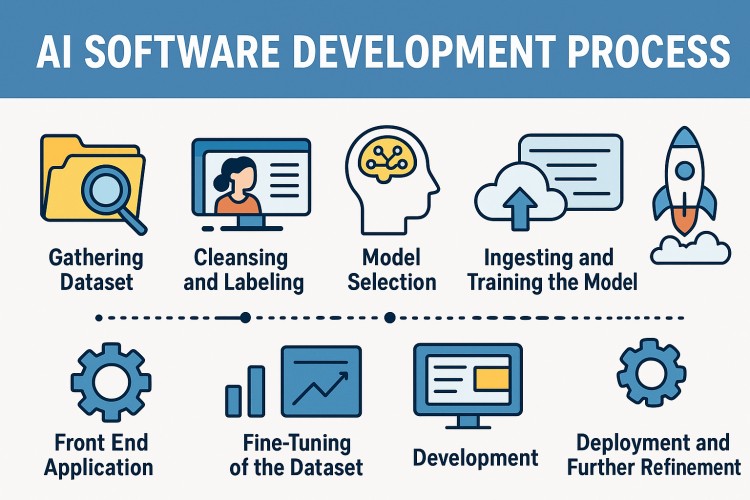In today’s fast-paced digital world, businesses are constantly seeking innovative ways to stay ahead of the competition. One of the most powerful tools transforming industries across the globe is Artificial Intelligence (AI). From improving operational efficiency to enhancing customer experiences, AI software is revolutionizing the way companies function.
However, developing AI software tailored to your business needs requires careful planning, precise execution, and a clear understanding of its potential impact. This comprehensive guide will walk you through the essentials of creating AI software for your business, highlighting its benefits, industry applications, development process, costs, and challenges.
How AI Streamlines Business Operations
AI software has emerged as a game-changer for businesses aiming to optimize operations and make data-driven decisions. By leveraging advanced algorithms and machine learning, AI can analyze vast amounts of data, identify patterns, and provide actionable insights that streamline workflows and reduce operational inefficiencies. Unlike traditional software systems, AI adapts and learns over time, enabling businesses to continually enhance their processes.
Whether it’s automating repetitive tasks, predicting customer behavior, or improving resource allocation, AI software allows businesses to operate smarter and more efficiently. Investing in Custom AI Software Development ensures that the solutions are tailored specifically to your organizational needs, maximizing ROI and long-term value.
AI in Customer Service: Revolutionizing Engagement
One of the most visible applications of AI is in customer service. AI-powered chatbots, virtual assistants, and automated response systems enable businesses to provide 24/7 support to customers. These AI solutions can handle routine inquiries, escalate complex issues to human agents, and even predict customer needs based on interaction history.
By enhancing customer engagement, AI improves satisfaction levels and fosters loyalty. Moreover, AI-driven analytics can help identify recurring problems, allowing companies to refine their products and services proactively.
AI in Process Automation: Enhancing Operational Efficiency
Operational efficiency is critical for business success. AI in process automation, often referred to as Intelligent Process Automation (IPA), streamlines tasks such as data entry, invoice processing, supply chain management, and more. Unlike traditional automation, AI can make decisions, detect anomalies, and adapt to new circumstances without constant human oversight.
Implementing AI in daily operations reduces errors, saves time, and frees employees to focus on higher-value tasks that require creativity and critical thinking.
Benefits of AI Software Development for Businesses
The advantages of integrating AI into business operations extend far beyond efficiency gains. Here are some of the key benefits businesses can achieve through AI software development:
Elevated Customer Service
AI transforms customer service by providing personalized and responsive support. Businesses can anticipate customer needs, deliver solutions proactively, and improve response times, all while maintaining consistent quality.
Informed Decision-Making
AI software analyzes complex datasets and generates actionable insights, empowering businesses to make decisions based on real-time information. Predictive analytics and trend forecasting enhance strategic planning and risk management.
Efficient Process Automation
From automating repetitive tasks to streamlining complex workflows, AI reduces operational bottlenecks and ensures smoother processes. This efficiency translates into cost savings and improved productivity.
Precise Demand Forecasting
For businesses that manage inventory, supply chains, or services, AI can accurately forecast demand using historical data, market trends, and customer behavior. This reduces overstocking, stockouts, and operational waste.
Enhanced Fraud Detection
AI algorithms excel at identifying unusual patterns and detecting potential fraud in real time. Financial institutions, e-commerce platforms, and other industries benefit from improved security and minimized financial risk.
Tailored Marketing Experiences
AI enables hyper-personalized marketing campaigns by analyzing customer preferences, purchase behavior, and engagement metrics. Businesses can deliver the right message to the right audience at the right time, increasing conversion rates.
Optimal Resource Allocation
AI helps allocate resources more effectively by analyzing workload distribution, employee performance, and operational demands. This ensures optimal utilization of human, financial, and technological resources.
How Every Industry is Utilizing AI in Their Business – A Glimpse
AI is no longer limited to tech giants; businesses across all sectors are leveraging its capabilities. Here’s how different industries are embracing AI:
- Healthcare: AI assists in diagnostics, predictive analytics, patient monitoring, and personalized treatment plans. From detecting diseases earlier to improving patient outcomes, AI is revolutionizing healthcare delivery.
- Manufacturing: In manufacturing, AI enables predictive maintenance, quality control, and production optimization. AI-driven robotics streamlines assembly lines, while data analytics minimizes downtime and operational costs.
- Cybersecurity: AI systems detect and respond to cyber threats in real time. By analyzing network patterns and potential vulnerabilities, AI strengthens security and mitigates risks proactively.
- Logistics: AI optimizes route planning, demand forecasting, and warehouse management. Companies can reduce delivery times, minimize costs, and improve supply chain transparency.
- Finance: Financial institutions use AI for fraud detection, credit scoring, algorithmic trading, and customer support. AI-driven insights allow banks and fintechs to operate efficiently while mitigating risks.
- Education: AI enhances personalized learning experiences, automates grading, and provides insights into student performance. Adaptive learning platforms help educators cater to individual student needs.
- Tourism: AI-driven recommendation engines, chatbots, and dynamic pricing models enhance customer experiences in the tourism sector. Travel companies can predict demand trends and offer personalized travel packages.
- Sports & Entertainment: AI analyzes player performance, fan engagement, and ticketing trends. In entertainment, AI recommends content, optimizes streaming services, and enhances audience interaction.
A Step-by-Step Guide to Building AI Software
Developing AI software involves multiple stages, from data collection to deployment. Here’s a structured approach:

Gathering Dataset
The first step in AI software development is collecting relevant data. High-quality, diverse datasets form the foundation for accurate AI models. Data can come from internal systems, public sources, or third-party providers.
Cleansing and Labeling
Raw data often contains inconsistencies, duplicates, or missing values. Cleansing ensures data quality, while labeling provides context for supervised learning models, making the AI more accurate and reliable.
Model Selection
Choosing the right AI model is critical. Options include machine learning algorithms, deep learning networks, or reinforcement learning models, depending on the complexity and requirements of the business problem.
Ingesting and Training the Model
Training involves feeding the cleaned dataset into the AI model, allowing it to learn patterns and make predictions. This stage may require significant computational resources, depending on the dataset size and model complexity.
Fine-Tuning of the Dataset
Post-training, fine-tuning improves model accuracy. This involves adjusting hyperparameters, balancing datasets, and addressing biases to ensure the AI performs optimally in real-world scenarios.
Front End Application Development
The AI model needs a user-friendly interface to be practical for business use. Developing a front-end application ensures that employees or customers can interact with the AI software effectively.
Deployment and Further Refinement
Once deployed, AI software must be monitored and updated continuously. Real-time feedback, system performance, and evolving business requirements necessitate ongoing refinement.
Overcoming Challenges in AI Software Development
Despite its benefits, AI software development comes with challenges that businesses must address to succeed.
- Integration with Existing Systems: Incorporating AI into legacy systems can be complex. Ensuring seamless integration requires careful planning, compatibility checks, and potentially middleware solutions.
- Ethical and Regulatory Compliance: AI must adhere to ethical guidelines and regulatory standards, particularly concerning data privacy, fairness, and transparency. Non-compliance can result in legal and reputational risks.
- Data Quality and Availability: AI models are only as good as the data they are trained on. Businesses must ensure access to high-quality, relevant datasets and implement strategies to handle missing or biased data.
- Scalability: AI software should be scalable to handle increasing volumes of data and users without compromising performance. Scalable architecture ensures longevity and adaptability.
- Data Security and Privacy: Protecting sensitive business and customer data is crucial. AI systems must implement strong encryption, access controls, and compliance with data protection regulations.
The Future of AI Software Development
The future of AI software development is incredibly promising. Emerging trends include AI-driven predictive analytics, autonomous systems, natural language understanding, and hyper-personalized solutions. Businesses will increasingly rely on AI not just for operational efficiency but as a core driver of innovation, competitive advantage, and customer satisfaction.
Investing in AI Software Development today allows businesses to create tailored solutions that adapt to evolving market demands, ensuring they remain agile and competitive in the years to come.
Conclusion
AI software is no longer just an optional tool; it has become a strategic necessity for businesses aiming to thrive in the digital age. By streamlining operations, enhancing customer experiences, and enabling smarter decision-making, AI offers tangible benefits across industries. While challenges such as data quality, integration, and regulatory compliance exist, careful planning and expert development can overcome them effectively.
Creating AI software tailored to your business through Custom AI Software Development ensures a solution that aligns with your goals, delivers measurable ROI, and positions your organization for long-term success. Embracing AI today is not just about technology—it’s about future-proofing your business for the opportunities and challenges of tomorrow.

